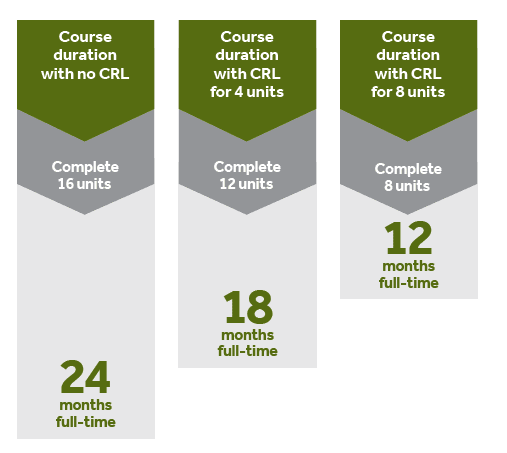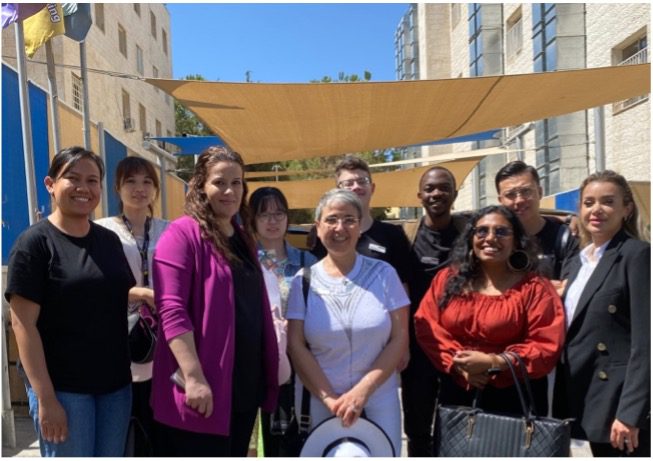Have you heard of ‘credit for recognised learning’? If you want to gain a postgrad degree, here’s how you can do it in less time… and with less cost!
No question, postgrad qualifications can help progress your career, or shift your career path entirely. In competitive career environments, employees who have a postgrad degree are clearly ahead of the game. Not only have they accumulated more expertise, but they’ve also demonstrated a commitment to continued learning and upskilling.
Of course, when you’re juggling work and life commitments, it’s a challenge to take on another task. The good news is that ‘credit for recognised learning’ can help you gain your postgrad degree quicker.
What is ‘credit for recognised learning’?
Credit for recognised learning (CRL) – also known as advanced standing – is a method that Curtin University uses to give you course credits for your prior learning or your work experience. We’ll give you CRL if you’ve completed units in another course – in a diploma or a micro-credential, for example – that matches the knowledge and skills taught in specific postgrad units, or if you’ve gained comparable expertise in your job or through other life experience.
What’s the benefit of CRL?
If your CRL application is approved, you won’t have to study those units in your Curtin course – which means that you’ll study fewer units and take less time to gain your postgrad degree, and reduce your tuition fees! And it’s also great to have the confirmation that your prior learning and acquired skills are recognised expertise that contribute to an advanced qualification.
Dr Abhi Singh, who is the course leader for Curtin’s Master of Commerce, points out another advantage:
“If you have an undergraduate business or commerce degree, you could gain CRL for up to 25% of your Curtin Master of Commerce – which not only reduces the course duration but also fast-tracks you into specialised units. At Curtin, this also applies to international students,” explains Dr Singh.
“If, in addition to a relevant degree, you have five years of work experience that aligns with your chosen major, you could receive even more CRL that would enable you to complete your master degree in a single year.”
This is how it looks:

CRL example: Curtin’s Master of Commerce
Commerce is a great example because it’s relevant to almost all economic sectors and industries, and because professionals working in business roles typically gain important skills during their work. Those acquired skills can be used to gain CRL for a Master of Commerce, an advanced qualification that can lead to rapid career advancement. The Master of Commerce is a two-year postgraduate degree, but with CRL you can gain your master degree in just 12 months.
As current Master of Commerce student YT Wan pointed out, you can even gain CRL for content you learned in your undergrad degree.
“I received CRL, as some of the content overlapped with topics I had studied in my Bachelor of Commerce. My course duration has been shortened by one semester, and reducing my overall study load has made it easier to balance my academic work with other responsibilities,” YT explains.
“It also gave me more time to pursue internships, which has been valuable in preparing for future employment.”

and broaden her international career prospects.
About Curtin’s Master of Commerce
Curtin’s Master of Commerce is an internationally recognised, industry-driven, future-focused program. With a choice of seven specialist majors, the program responds to the needs of business professionals to upskill quickly and have the flexibility to capitalise on market opportunities. These are the majors you can choose:
- Artificial Intelligence and Business Analytics
- Finance
- Human Resources
- International Business
- Marketing
- Supply Chain Management
- Sustainable Business Leadership.
Another great thing about the Master of Commerce is that it is a tiered, or ‘stackable’ program. This means that, if your circumstances change, you can exit your studies earlier with a Graduate Certificate or Graduate Diploma in Commerce.
For postgrad students working full-time and meeting family responsibilities, completing their Master of Commerce fully online will help them to balance their commitments. On-campus learning is also an option. This flexibility is the key to balancing your commitments while being able to fast-track your career – or adapt your career path – through gaining a higher-level qualification.
We asked the course coordinator of Curtin’s Master of Commerce some key questions to unpack all that, to help you decide whether it’s a good option for you.
Q&A with Master of Commerce program lead, Dr Abhi Singh

Dr Singh, is there a certain category of career professionals who benefit most from studying Curtin’s Master of Commerce?
“Actually, this is highly valuable postgrad qualification for anyone looking to build or advance a career in business in Australia or internationally.
“It’s a versatile program designed for a wide range of professionals with differing backgrounds, interests and career goals. It will benefit business graduates who want to deepen their expertise, professionals aiming for career progression or future management roles. And It’s ideal for aspiring entrepreneurs, as well as international students pursuing globally relevant skills and opportunities.”
Will it help people who want to change their career path?
“Certainly. A Master of Commerce will help individuals from non-business backgrounds – such as science, health or the arts – to enter the commercial sector.
“People usually pivot their careers because they become interested in specialist, in-demand areas – such as AI, business analytics, supply chain management, marketing, human resources. Curtin’s Master of Commerce enables them to build both their technical and leadership abilities in those areas, and more.
“It’s also valuable for professionals who are ready for global mobility, by providing internationally relevant skills and a well-recognised degree that can open opportunities worldwide.”
How do you ensure the Master of Commerce remains relevant to, and even anticipates, industry changes and needs?
“Industry relevance is paramount. It’s vital that the course responds to those fast-moving areas like sustainability, data and analytics.
“The strong market outlook for expertise in those areas is driven by several trends, including the rapid expansion of the ‘care economy’, and the focus on energy transition and environmental sustainability.
“There’s also a projected shortage of data and digital skills, but above that, understanding the impact of the digital revolution on people, communities and society is an emerging area for business.
“Organisations realise that advances in automation and technology will reshape their workforce, and employers need staff with the judgement and interpersonal skills for managing change.”

Can you explain more about how you update the course?
“We regularly undertake comprehensive course reviews, and incorporate new content made based on emerging trends, market needs, and feedback from stakeholders. We also utilise labour market data. For example, the current KPMG jobs report identifies tech, marketing and HR as among the fastest-growing occupations in Australia.
“In 2024 we completed a comprehensive review of Curtin’s Master of Commerce, in which we benchmarked against leading postgrad commerce programs nationally and internationally. The review confirmed that our existing majors continue to align with careers that have high growth potential and long-term relevance. But it also led us to establish the two new majors: Artificial Intelligence and Business Analytics, and Sustainable Business Leadership.
“Course units are also externally reviewed by academics from top-tier providers to check the relevance of the Curtin program. We also utilise our strong partnerships to gain insights from employers, professional bodies and advisory boards, to ensure the curriculum reflects what employers need now and into the future.”
So, is Curtin’s Master of Commerce more suited to early career professionals than those with many years of business experience?
“Not at all. We’ve designed the program for both cohorts. It offers the flexibility and choice to meet the needs of early-career individuals and experienced professionals.
“For career changers, and those in the early stages of their careers, we include core units that develop foundational business knowledge and skills – which is why the program also suits students from non-business backgrounds.
“For more experienced professionals, we offer advanced units and specialised majors that support career progression and transitioning into leadership roles.”
How does the course help graduates transition into leadership or specialist roles?
“It’s designed to support career advancement – whether that involves leadership or specialising in a particular field – through a combination of academic depth, industry alignment and practical application.
“Students develop deep, discipline-specific knowledge in their chosen major, which prepares them for roles where advanced technical and strategic skills are prioritised.
“Each major also includes live industry projects, consulting-style assessments and case studies, giving students client-facing, hands-on experience with real-world challenges. Exposure to guest speakers and networking opportunities give students practical insights and the confidence to embark on new roles.
“Our students benefit from that industry engagement, through guest lectures, live industry projects, and (where relevant) field trips that expose them to real-world contexts and practices.”

enjoy a study tour in Jordan.
What are the other emerging trends to watch in the realm of global business?
“Climate risk, ethical leadership, data storytelling and AI in business – and these are topics that we’re already embedding into the curriculum. It’s important that students understand both the technical and strategic influences of those areas on contemporary business challenges, which is one advantage of the interdisciplinary design of Curtin’s Master of Commerce.”
Learn more about Curtin’s Master of Commerce and applying for CRL
Explore Curtin’s Master of Commerce at curtin.edu/master-commerce. To learn more about applying for CRL, visit curtin.edu/applying-crl.

